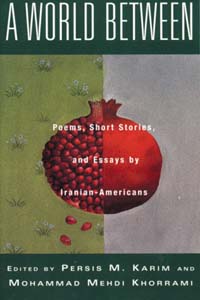![[MetroActive Books]](/books/gifs/books468.gif)
[ Books Index | San Jose | MetroActive Central | Archives ]

A World Between: Poems, Short Stories and Essays by Iranian-Americans Edited by Persis M. Karim and Mohammad Mehdi Khorrami George Braziller; 286 pages; $30 cloth, $18.50 paper Between the Lines Iranian-Americans speak in verse and prose in new anthology
By Mary Spicuzza IF ONLY SOLMAZ SHARIF had written the Cinderella story, the world would be a much better place. The Los Angeles-based poet understands the cultural significance of the simple shoe just as clearly as Prince Charming and poor Cinderella did. But Sharif, one of the more than 30 contributors to A World Between: Poems, Short Stories, and Essays by Iranian-Americans, also knows that waiting around for the right glass slipper to transform the future is far less productive than exploring magic in the footwear all around her. "They were my father's shoes./My mother looked at them and saw a donation to Goodwill./My father looked at them and saw his life," Sharif writes in "My Father's Shoes." "They were there with him on his last step in his home country./They were there with him when he first saw me./They kissed the dirt of the 'land of opportunity.' " Like many of the writers featured in the anthology, edited by UC-Santa Cruz graduate Persis M. Karim and Mohammad Mehdi Khorrami, the young poet had never before been published. Sharif is only 15 years old and wrote the beautiful ode to her father before starting high school. Rather than weighing the book only with the words of tortured writers and artists from her homeland, Karim includes pieces by teens as well as musicians, historians and law students. Some contributors explore issues of identity, others confront the stereotype that all Iranians are fanatical terrorists. But whether heavy with pain, seething with anger or just warm with family memories, all of the pieces work together to show that the more than 1 million Iranians living in the U.S. may share experiences but they are anything but homogenous. The diversity of voices included in the anthology makes A World Between resonate with power. IN THE PREFACE, Karim explains that the main inspiration for World was a panel discussion in which an "expert" told her that Iranians born in America have no problems bridging cultural gaps. Remembering growing up on tongue sandwiches instead of the standard peanut butter and jelly, Karim suspected that she and other Iranian-Americans had a more complex story to tell. "When I finally learned the Persian word for people like me, do-rageh (two-veined) with two bloods running through me, I began to embrace my complex heritage to see that it enriched me," Karim writes. "This book is for those young people who, like me, have searched for ways to express and understand the complexities of what it means to live in the aftermath of their parents' migrations." Like any portrait of race relations and ethnic stereotyping in America, A World Between could easily become a descent into depression. But while the pieces are sometimes painfully harsh, they are also full of warmth, honesty and spirit. Mariam Salari begins her short story "Ed McMahon Is Iranian" with a drive-by splattering of red paint all over the family's front door during the Iranian hostage crisis. The narrator, a little girl, believes that she isn't a real American until her father convinces her that the county is secretly full of Iranians--even the all-American Ed McMahon happily chatting on the television. "Of course my dad, with his accent, could have made John F. Kennedy sound like an Iranian name," Salari writes, "but that didn't matter to me." While the most famous writer may be Nahid Rachlin, a published novelist and professor of creative writing at the New School for Social Research in New York, A World Between doesn't traffic in star power. Most of the selections are previously unpublished, including poems and short stories by Karim, a former City on a Hill journalist who is now an assistant professor of English and comparative literature at San Jose State University. With selections ranging from Arash Saedinia describing the rituals of giving and receiving food with "ta'rof" to Tara Fatemi fantasizing about being as tough as Pinky Tuscadero in "My Fifties--Theme Birthday Party," the book doesn't depend upon bigger-name authors. Twenty years after the Iranian Revolution and the mass migration of millions of people, it's clearly time for a collection that brings together writings by both immigrants and first-generation contributors. Rather than lament the difficulties of the journey, A World Between celebrates hopes for the future as it honors the past. Or, as Reza Shirazi writes in his poem "Learning Persian": "The world lies before it/waiting to be sung." [ San Jose | MetroActive Central | Archives ]
|
From the November 4-10, 1999 issue of Metro, Silicon Valley's Weekly Newspaper.
Copyright © 1999 Metro Publishing Inc. MetroActive is affiliated with the Boulevards Network.
For more information about the San Jose/Silicon Valley area, visit sanjose.com.